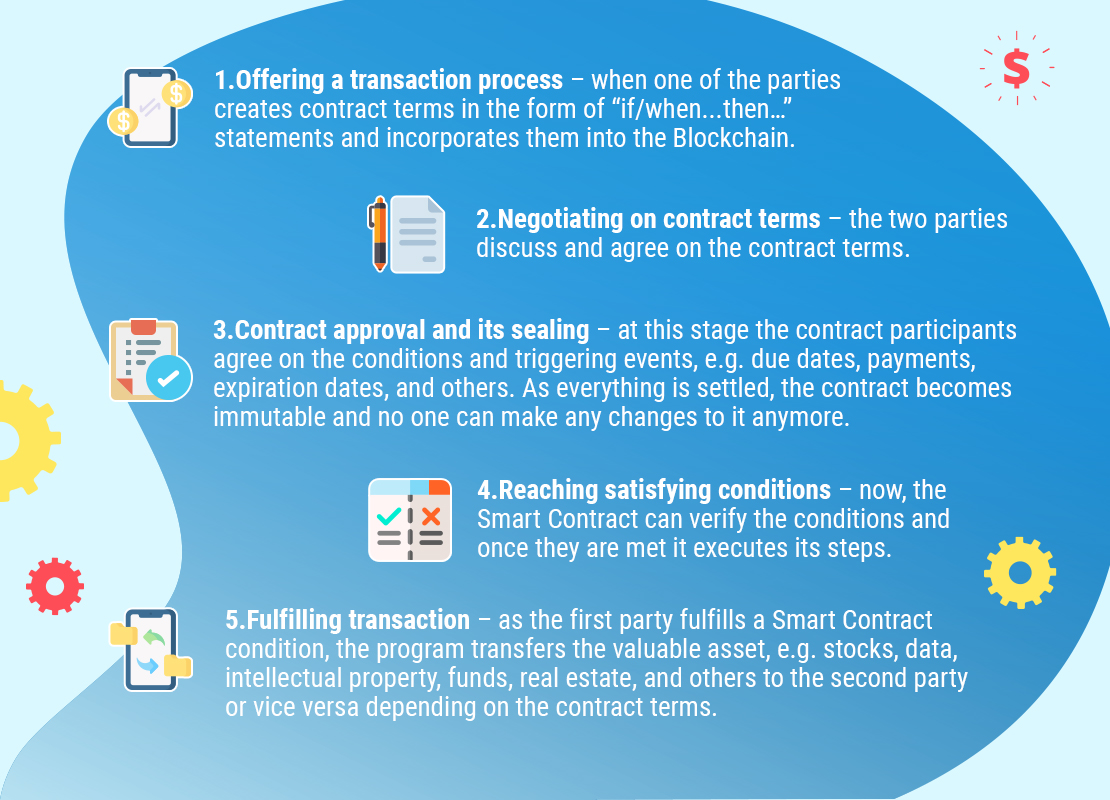What is a Smart Contract?
Rapidly developing Blockchain technology is immensely influencing the financial world and now we can already witness the rise of a new economy – the crypto-economy. However, Blockchain advancements are not limited only to finance. Blockchain developers have recently come up with a new Blockchain technology that is actively conquering the market and has already become highly popular among many businesses – Smart Contracts.
Blockchain Smart Contracts are a disrupting technology for legal institutions. It allows businesses to exclude third parties from the creation of agreements and improve their inner paper flows. In this article, we’ll look into what Blockchain Smart Contracts are, their benefits, and how companies are already applying this technology for their successful development.
The Notion of Smart Contract
Smart Contracts run on Blockchain technology. They can be used as real-life contracts for concluding agreements for various businesses.

The key advantage of Smart Contracts is that they don’t require any middlemen like lawyers or legal representatives to enforce any negotiation. Contract participants can create Smart Contracts on their own and get executed automatically once included conditions are met. This way, contractors can save much time and money when they rent apartments, exchange money, register vehicles, or even hold presidential elections.
There is a wide range of cases when Smart Contracts can be applied and many companies already do. For example, Slock.it helps its users to automate sharing, payments, and rentals with Smart Contracts. Fizzy AXA uses Blockchain to automate flight insurance compensations. Populous alleviates buying and selling outstanding invoices using Smart Contracts, and many others.
Blockchain Smart Contracts have shifted from a theory to daily practice for many companies long ago and their popularity is only growing. According to the Global Opportunity Analysis and Industry Forecast, 2021-2026 report, the global market size of Smart Contracts is forecasted to hit the mark of $345.4 million by 2026, from $106.7 million in 2019, at a CAGR of 18.1%.
How Do Blockchain Smart Contracts Work?
Two main concepts form the basis of Smart Contracts – logical patterns and Blockchain.
All Smart Contracts follow the same logical pattern — “if/when…then…” statements. These statements describe the conditions when contracts get executed. For example, if the buyer confirms with a receipt that the goods are delivered, then the Smart Contract releases and transfers the money to the seller.
Smart Contracts can contain simple statements or a complex system of stipulations that should be completed to satisfy both sides of the contract. Therefore, each contracting party should participate in Smart Contract creation. They need to agree on the rules which fulfill transactions, carefully consider all the possible exceptions, and elaborate on the steps on resolving disputes.
Blockchain is the technology that supports Smart Contracts execution and ensures that it’s fair for both sides. It means that contract participants believe that the contract works according to the preset rules and nobody can change them or delete them from the system. It is possible due to the Blockchain features. It has a transparent and decentralized nature which allows the contract participants to track each agreement step execution and restore the contracts in case they’re lost by one of the sides.
Here are the 5 steps the contract participants need to take to put Blockchain Smart Contracts to action.
Benefits of Blockchain Smart Contracts
There are a variety of businesses from diverse niches that effectively use Blockchain Smart Contracts in their work. Why do they prefer this technology to addressing traditional legal institutions?
Here are the main benefits companies obtain from using Blockchain Smart Contract:
- Cost-effective – with Smart Contracts businesses save on notary processes, excluding any intermediaries from the contract conclusion. This way, they replace lawyers by automating many manual processes, reducing operational costs.
- Time-saving – using Smart Contracts businesses save up their time on traditional paperwork associated with finalizing all the agreements.
- Autonomous – Smart Contracts are executed automatically and don’t require any verifications from lawyers or notaries.
- Possibility to backup – Blockchain technology determines that each Smart Contract should be shared with each participant of the system. This way, it’s hardly ever possible to lose any contract or its data as they are duplicated many times over.
- Safe – once a Smart Contract is approved nobody can change its structure as it’s determined by the Blockchain specifics. It means that once any Blockchain participant changes the data in its blocks, it stops matching with the data of other members, resulting in errors.
- Accurate – Smart Contracts minimize the number of manual mistakes which can appear during the contract preparation. All the terms and conditions are put into Blockchain and never change.
Where Could Smart Contracts Be Used?
Smart Contracts are versatile technology that can be applied across diverse industries from insurance to healthcare services and more. Let’s have a closer look at some of the most prominent examples of Smart Contracts implementation.
Healthcare
In healthcare, Smart Contracts can be used in several ways. For example, healthcare institutions can archive patient data, making it immutable and accessible only to certain specialists. Besides that, some medical institutions use Smart Contracts to transport life-saving medications. They help to increase the transparency of medications supply chains and better control the conditions in which they are delivered.
Insurance
Smart Contract technology has triggered the development of parametric insurance. This type of insurance is automatically paid when certain events happen. The events should be clearly defined and pre-agreed in the contract. For example, in case of bad weather conditions such as hurricanes or earthquakes, an insurance company can establish automatic payments of certain amounts.
Besides weather conditions, parametric insurance may be applied to the farming industry, financial markets in the condition of a volatile economic environment, technology failures, e.g. flight delays or self-driving car accidents, and many others.
Transportation and Logistics
Many logistic companies use Smart Contracts and Blockchain technology to improve the efficiency, security, and transparency of their businesses. For example, in logistics, Smart Contracts are used to automate the legal binding of agreements with various suppliers. Whereas Blockchain helps to monitor the performance history of individual vehicles, track goods delivery in real-time, and find more efficient routes between the goods sender and their receiver.
Supply Chain Management
Some supply chain companies use Smart Contracts to resolve issues with vendors and producers. Moreover, with the help of Blockchain, it’s much easier to track the flow of goods from their point of origin to the store shelves. They can also automate the routine associated with payments and document management.
Apart from automating many processes in supply chains, Smart Contracts are very popular among suppliers due to their ability to maintain continuous document flow and speed. For example, in the times of the Covid-19 and Brexit events, which resulted in contract delays and much uncertainty, Smart Contracts helped to support the stability of the concluded deals and allowed to quickly create additional contracts to meet new requirements.
Financial and Banking Sector
Smart Contracts are widely used for effective financial data tracking. They accurately record the data on each money transaction in a uniform format, being transparent to all the system participants. As a result, companies improve their financial reporting and data integrity among company departments and between businesses. Also, with Smart Contracts, financial institutions can manage loans, improve paper audits, perform real-time fund transfers, verify credit scores, and much more.

The banking sector is also actively seeking ways to implement Smart Contracts and Blockchain technology in the work. For example, banks can use these technologies to improve their KYC (Know Your Customer) procedures to verify their customers in the cross-banking systems faster and thereby cut down on their operational costs. Also, they could use Blockchain to perform money transactions much faster and cheaper than most of today’s banking systems. Finally, Blockchain can be used for facilitating and alleviating global trade processes through regulating financial liabilities, verifying goods quality, and other trade-related activities.
Public Sector
The public sector involves a variety of agencies and enterprises that deliver public programs, goods, and services. And all of them can use Blockchain technology and Smart Contracts to improve their efficiency and workflow. Here are some notable examples:
- real estate – with Smart Contracts, it’s really simple for real estate businesses to transfer property ownership. As this process is quite risky, Smart Contracts can resolve many issues associated with money transmission and agreeing on contract terms, making them clear for both parties;
- voting – many governments are moving towards online voting, e.g. some states in the US already held their last elections online. Although this system is convenient, it’s prone to hacking, that’s where Blockchain technology could be very helpful. It can help to protect all the votes and allow to simplify the voting process while ensuring the transparency of the results;
- customs – with Blockchain customs agencies can make their security systems even safer by encrypting the stored and shared data from security cameras and sensors. Also, Smart Contracts could be used to encrypted data to validate the quality and origin of the goods they import;
- education – universities, schools, and colleges can use Smart Contracts to pay grands and validate the issued certificates, diplomas, or any other academic documents;
- taxation – taxation system is one of those that need to perform heavy calculations while being well-protected. Blockchain technology can handle both tasks perfectly. Moreover, the system can count everything automatically and then use Smart Contracts to send transactions to the Blockchain participants.
Conclusion
Smart Contracts are a relatively new technology based on Blockchain. Nevertheless, it has already been widely implemented by many industries around the world. Smart Contracts are used in healthcare, real estate business, supply chain management, finance management, logistics, insurance, and many other fields.
Many businesses prefer using Smart Contracts in their work as they alleviate management and paper flow processing, ensure strong data protection, and help companies to save their time on routine operations, and reduce operational costs in offices.
If you’re seeking reliable smart contract development services to implement this innovative technology into your business operations, we’ve got you covered.












